Japan looks good - but it's not time to invest there yet
The conditions are in place for the Japanese market to turn around after years of disappointment. But first deflation needs to be wiped out once and for all. And that might be a long time coming, warns Cris Sholto Heaton.

Get the latest financial news, insights and expert analysis from our award-winning MoneyWeek team, to help you understand what really matters when it comes to your finances.
You are now subscribed
Your newsletter sign-up was successful
Want to add more newsletters?

Twice daily
MoneyWeek
Get the latest financial news, insights and expert analysis from our award-winning MoneyWeek team, to help you understand what really matters when it comes to your finances.

Four times a week
Look After My Bills
Sign up to our free money-saving newsletter, filled with the latest news and expert advice to help you find the best tips and deals for managing your bills. Start saving today!
It's been a busy fortnight in the markets, with the rally running out of steam amid fears over Greece's debt problems. It's always risky to second-guess the markets over the short term. But my feeling for now is that this has the potential to turn into the big sell-off I've been expecting for months. Sentiment has shifted. Bad news is being seized upon and good news ignored.
That doesn't worry me very much. A slump now will present us with better buying opportunities in a number of stocks.
Back to today's topic. There is one big issue on my mind and it's not the crash. I've long been relatively upbeat on the prospects for a turnaround in Japan. In most ways I still am. But recent Japanese economic data makes me suspect that however cheap the market looks, it's likely to underperform for a few more years. Here's why...
MoneyWeek
Subscribe to MoneyWeek today and get your first six magazine issues absolutely FREE

Sign up to Money Morning
Don't miss the latest investment and personal finances news, market analysis, plus money-saving tips with our free twice-daily newsletter
Don't miss the latest investment and personal finances news, market analysis, plus money-saving tips with our free twice-daily newsletter
Two decades of disappointment
No market has disappointed as much as Japan over the past year. While many are up some 50%-100% since the March lows, the Topix is up just 30%.
Why has it been left behind in the relief rally? More broadly, why has it performed so poor over the last two decades? Today, it's down 70% from its high at the end of 1989, as the chart below shows.
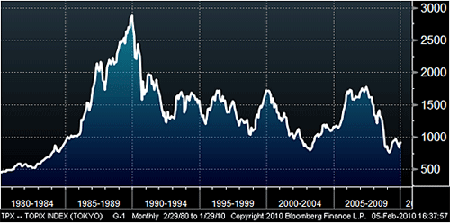
Figure 1. Japan's Topix stockmarket index
The second question is easy to answer. At the peak in 1989, the Japanese market traded on truly staggering valuations. Its price/earnings ratio was over 70. When a bubble like this bursts, it rarely falls back to a low valuation immediately. Instead, it declines over a period of many years, with frequent failed rallies and subsequent slumps.
Only when equities are generally regarded with distaste and valuations hit rock bottom is the process over. And given the size of its bubble, it's no surprise that Japan endured an especially long and painful bear market.
However, you'd expect it to have hit the bottom by now, 20 years after peaking out. Towards the end of 2008, the Topix was on a price/book value of 0.8 times. In other words, the average company was selling for 20% less than the value of its assets. It's rare for valuations to get much more depressed.
And although the Japanese economy still has plenty of problems, one crucial drag apparently ended in 2006. In the aftermath of the bubble, many companies found themselves with huge debt burdens and assets that were worth much less than they had paid for them. So for more than a decade, firms channelled their spare cash into paying off debt (deleveraging'), rather than investing, returning money to shareholders or raising wages.
On top of that, there was plenty of spare capacity left in the economy. Combine that with the weak demographics (too many old people and not enough young, basically) and you had a recipe for one thing deflation. And since deflation makes borrowings (which are a fixed amount) larger relative to a firm's earnings (which tend to change with prices), this makes a company's debt burden seem even more onerous. That in turn encourages more deleveraging.
But in 2006, the corporate sector became a net borrower again. This suggests that firms had finally become comfortable with their debt loads. This step should have been key to turning the Japanese market around. Until companies stopped fixating on paying down debt there could be no sustainable economic recovery. But once it happened, things should have looked pretty encouraging for Japan.
Deflation makes a comeback
So what went wrong? As we all know, the global recession hit Japan hard. This created a large amount of spare capacity in the economy and plunged it back into deflation. Consumer prices were down 1.7% year-on-year in December (see chart below), while regular earnings were down 0.9%. Total cash earnings which include annual bonuses, heavily cut this year were down 6.1%.
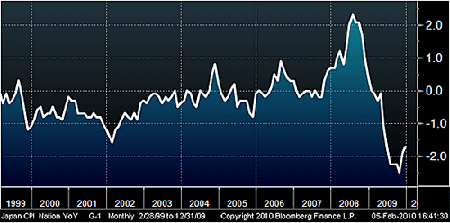
Figure 2. Japan Nationwide CPI, year-on-year percentage change
There is a risk that this lurch back into deflation could drive companies to start deleveraging again. That would hurt both the economy and the stockmarket. Fortunately, there's not much sign of that yet. But it's still a problem for investors, because it means that the driver of a new bull market in Japan isn't coming into place yet.
For the Japanese market to boom, people have to want to buy equities. But in a deflationary environment, equities are less attractive than bonds. That's because dividends on stocks are likely to fall in response to lower prices and earnings, while the payments from a bond are generally fixed.
There are exceptions to this the 1920s in America was a generally deflationary period, but it was also excellent for stocks. But a deflationary boom like that, driven by productivity improvements, technological gains, good demographics and the country's growing international power, is not on the cards in Japan today. Instead, we have price deflation driven by overcapacity and a lack of purchasing power in the economy, which is always bad.
Japanese investors' preference for bonds over equities is why the government can keep paying such low rates on its debt despite a public debt-to-GDP ratio of more than 200%. The 1.39% yield that the ten-year bond currently offers (see chart below) may look pathetic by international standards. But Japanese institutions and individuals who want to keep their money in yen are dispirited after 20 years of declining stockmarkets. For those accustomed to deflation, that 1.39% looks acceptable.
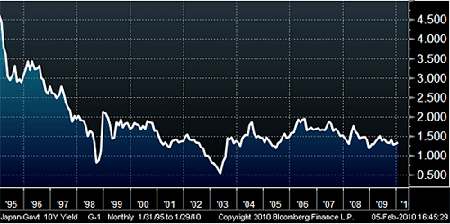
Figure 3. Yield on ten-year Japan Government Bond
So until we see inflation again, investors are unlikely to move out of bonds and into equities. And remember that Japan has an ageing population with many people drawing down their savings. That means there's no significant new net flow of funds to come into equities. If money is to go into shares, it must move out of other assets.
In theory, we could see money come in from foreign investors. But they're chasing higher growth in emerging markets. Japan is as out of favour as it ever has been. Foreign investors are unlikely to come back until the market gathers momentum again which won't happen until domestic investors pile back in.
Expert tips & advice for investing in Asia! Claim your FREE guides from MoneyWeek that include:
- How to go about investing to Asia
- Which brokers to use to buy foreign shares
Inflation is likely but not for a while
In short, Japanese equities will probably lag behind other markets until inflation picks up again. So how likely is that?
In the long run, it seems very probable for two reasons. First, the Democratic Party of Japan (DPJ) government that took over from the formerly dominant Liberal Democratic Party (LDP) last year seems to be taking a new approach to fixing the economy. The LDP focused on public works spending to try to support the economy. This was initially useful but later turned into a way to buy votes from the construction industry. The DPJ is aiming to boost consumption instead.
To do this, they'll need to lift wages. Wages stagnated for most of the lost decade, as the chart below shows. But for wages to go up, there needs to be some inflationary pressure in the economy. The new finance minister Naoto Kan clearly regards this as a top priority and is asking the central bank to do more to more to tackle deflation.
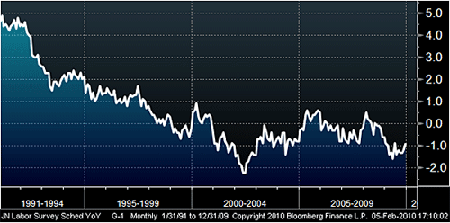
Figure 4. Japanese nominal regular monthly earnings, year-on-year change
But what can the Bank of Japan do? Well, Japan's last period of deflation came amid a global climate of generally falling inflation. But that's unlikely to be the case in years to come. Developed world governments have run up substantial debts in dealing with the latest crisis. Even more importantly, they face vast unfunded liabilities in their pension and healthcare systems, as the chart below shows.
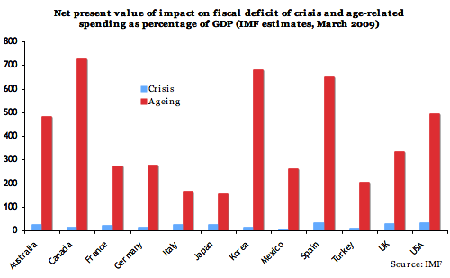
Figure 5. IMF estimates of cost of crisis and future age-related spending
In many cases, these liabilities probably can't be met as they stand. It's sensationalist to say that developed world governments are insolvent, but they are unlikely to be able to meet all these promises. So they can either explicitly default on these obligations, or they can try to inflate them away, or most likely a mixture of the two.
This will mean extremely low short-term interest rates in most developed economies for a long time. It's also likely to mean large amounts of debt monetisation. This is when central banks buy up government debt directly. All else being equal, both will increase inflation and cut the real value of outstanding government debt.
Of course, Japan tried both of these during the lost decade, with little impact. That's because against a backdrop of debt-driven deleveraging, easy monetary policy has little impact (unless you take it to such extremes that you destroy faith in the currency). And with deleveraging underway in economies such as the US and UK, the same trend looks likely to play out again for a couple of years.
So global inflation won't pick up immediately. But the deleveraging and restructuring in the West is likely to be less drawn out than in nineties Japan because central banks are acting much more aggressively than the Bank of Japan did. So it seems probable that we'll face high and rising inflation within a few years.
If so, Japanese equities will be a good way to play this, since the re-emergence of inflation will make them superior to bonds for local investors once more. Also, with its own deleveraging period over, the ingredients for a Japanese economic recovery are coming into place. Corporate restructuring, the removal of excess capacity and the return of wage growth over the next few years should mean that while Japan will never grow quickly (probably 1.5%-2.5% a year at best), the domestic economy will be more robust and corporate profitability will be better.
But until this happens, there will be no catalyst to transform the outlook for the stockmarket. Indeed, as we saw above, the latest numbers point to a risk of another deflationary spiral in the near term. So while I'm optimistic that the Japanese market is poised to emerge from its lost decades, I'm waiting for signs that deflation is dead before I consider investing more in it.
This article is from MoneyWeek Asia, a FREE weekly email of investment ideas and news every Monday from MoneyWeek magazine, covering the world's fastest-developing and most exciting region. Sign up to MoneyWeek Asia here.
Get the latest financial news, insights and expert analysis from our award-winning MoneyWeek team, to help you understand what really matters when it comes to your finances.

Cris Sholt Heaton is the contributing editor for MoneyWeek.
He is an investment analyst and writer who has been contributing to MoneyWeek since 2006 and was managing editor of the magazine between 2016 and 2018. He is experienced in covering international investing, believing many investors still focus too much on their home markets and that it pays to take advantage of all the opportunities the world offers.
He often writes about Asian equities, international income and global asset allocation.
-
 Early signs of the AI apocalypse?
Early signs of the AI apocalypse?Uncertainty is rife as investors question what the impact of AI will be.
-
 Reach for the stars to boost Britain's space industry
Reach for the stars to boost Britain's space industryopinion We can’t afford to neglect Britain's space industry. Unfortunately, the government is taking completely the wrong approach, says Matthew Lynn